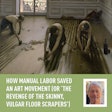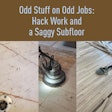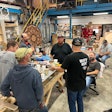
I had an exotic refinish a few years back and was unsure of what problems I may have because this wood was unfamiliar to me. So before I submitted the bid I called the Bona tech line and found out the species in question has oils in the fibers that can ruin a good result if I used the same finishes I always used for oak, maple, hickory and so on. I was grateful, to say the least! It turned out I was the only contractor bidding on that job who submitted documentation justifying my higher cost (the documentation was the Bona email I received from their tech department). In the end, I got the job in spite of having the highest price. The contract ended normally, and I never heard of the customer again … but I had the money.
This story is not about high prices, how to get high prices or how to defend high prices—because my price was not “high.” It was just normal for the species of flooring on that job.
Had I just asked around among other pros, I doubt I would’ve gotten the same answer, and the failure of the job would’ve been terrible to bear ... and it would’ve all been my fault. Justifiably my fault.
The point here is not just asking before jumping into a job, but asking the right source.
The right source can be another wood flooring master who has undeniable experience and proven performance … AND the right source can be the manufacturer or trade organization. Which is better? Well, being the guy who has frustrated attorneys in the past (more than once), I’m sticking with the manufacturer and/or trade organization that is related to the issue at hand.
The reason for my rant is that I notice some posters in the Facebook wood flooring groups asking common questions that could easily be answered by checking the industry standards or asking the manufacturer of those products.
Let me say that the masters in the groups are masters of the highest regard—I’ve personally commented that I “only do normal stuff” as opposed to the absolute mind boggling art that some of my comrades produce. But for lesser mortals like myself, I advocate that you get your information from a source that a court of law would respect and stick to it with precision; that way you remain beyond reproach should an issue arise. Because “Joe on Facebook said it was okay” doesn’t work. (In a court of law, judges don’t even want to talk to you; they only want to hear and/or talk to attorneys. If you shout out “… but judge!,” the judge won’t even address you but will ask your attorney to have his client restrain himself from talking in court. It’s weird up there, but that’s how the game is played.)
A court of law doesn’t care what Joe said, or even getting multiple masters to testify on your behalf. All this means nothing when compared to the industry standards and/or manufacturers’ recommendations. This trade is old—even older than castles from the days of Napoleon—and every issue has been figured out by now, with few exceptions. The answers are laid out in simple form and called “industry standards” for a reason, a LEGAL reason.
I am not an attorney, but I have been asked to perform inspections by manufacturers, homeowners, the state license board, attorneys and other contractors. If I see something in violation of industry standards and reference it to the established industry standards (like the NWFA or the manufacturer of the product), my observation is just as important as anyone’s, and my observation becomes a weapon when repeated by an attorney to a judge. Therefore “what Joe said” has no value if it cannot be referenced—or connected to—established industry standards. They are that important.
See all of Angelo DeSanto's popular blog posts and magazine articles here.

































